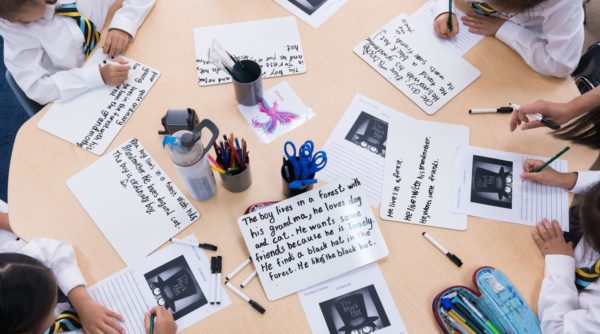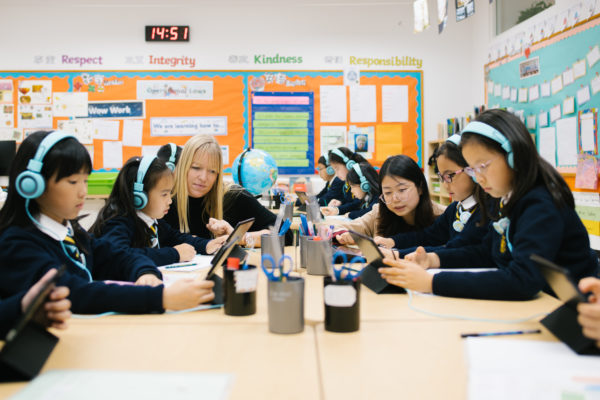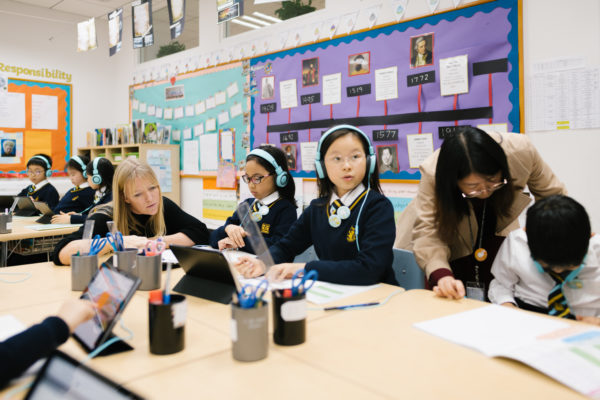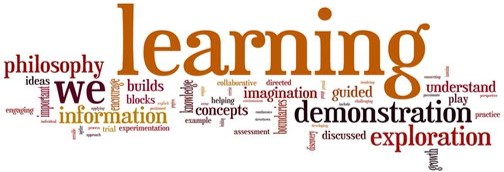
 Evelyn Henderson Head of Theme I have been teaching for 15 years in the UK and then more recently in China. In 2018, I arrived in Shanghai and took on the role of founding head of English at Hiba, and it has been an invaluable experience. This year, head of theme is a new role, and I am excited to be a part of developing the curriculum alongside other experienced leaders and teachers. The opening and development of the High School and Junior High is key to the Primary team setting the foundations for our pupils’ future education.
Evelyn Henderson Head of Theme I have been teaching for 15 years in the UK and then more recently in China. In 2018, I arrived in Shanghai and took on the role of founding head of English at Hiba, and it has been an invaluable experience. This year, head of theme is a new role, and I am excited to be a part of developing the curriculum alongside other experienced leaders and teachers. The opening and development of the High School and Junior High is key to the Primary team setting the foundations for our pupils’ future education.  Our theme-based curriculum helps our pupils develop their English language acquisition across several subjects, not just theme lessons.
Our theme-based curriculum helps our pupils develop their English language acquisition across several subjects, not just theme lessons.
In a theme-based curriculum each skill area of the curriculum is connected to a topic which we refer to as a theme. Learning through themes gives pupils the opportunity to see learning as a connected process that they can apply to real life. Pupils of all ages benefit from the connections made across the curriculum.  Rather than teaching each skill or topic in isolation, pupils are encouraged to recognise that at different times of the day or through different subjects we can learn about different aspects of a larger topic. In turn, this helps them make their own connections and they can then start to make their own connections from one experience to another.
Rather than teaching each skill or topic in isolation, pupils are encouraged to recognise that at different times of the day or through different subjects we can learn about different aspects of a larger topic. In turn, this helps them make their own connections and they can then start to make their own connections from one experience to another.
Theme-based education is especially unique at Hiba. Our curriculum is exciting and engaging. Our teachers have the experience and flexibility to build themes based around pupils’ interests while teaching age appropriate skills. The curriculum teaches the skills and knowledge pupils need to become historians, scientists and geographers. Teachers plan opportunities for skills to be applied in an environment where pupils can flourish, extending themselves and their learning beyond what they thought possible.  Because we are a bilingual school, pupils are taught by teachers who speak both languages. Details of the new key concepts are taught in both Chinese and English by co-teachers, allowing pupils to ask and answer questions in both languages while developing their bilingual and biliterate abilities. We introduce technical vocabulary in English, but pupils can share their previous knowledge and understanding in Chinese as well. This co-teaching model is fundamental in allowing pupils to use their first language to access previous knowledge and understanding while developing their bilingual and biliterate understanding.
Because we are a bilingual school, pupils are taught by teachers who speak both languages. Details of the new key concepts are taught in both Chinese and English by co-teachers, allowing pupils to ask and answer questions in both languages while developing their bilingual and biliterate abilities. We introduce technical vocabulary in English, but pupils can share their previous knowledge and understanding in Chinese as well. This co-teaching model is fundamental in allowing pupils to use their first language to access previous knowledge and understanding while developing their bilingual and biliterate understanding.
In geography, for instance, they might learn about different aspects of clothing around the world. They might discuss the implications of climate, available materials and the types of clothing worn by different nationalities. They would discuss the climate differences and how this effects the clothes people wear in different countries.  Pupils would begin to build up collections of vocabulary and phrases in English and learn how to spell and use them in relation to the theme. They might use online resources or go on a field trip to see how garments are made. This could then link directly to science, where they investigate the different properties of materials and then look at how these materials are used and why. Through art, pupils might experience the world of collage or have opportunities to sketch out clothing designs using chalk, charcoal, pastels or ink. This thematic approach provides pupils with opportunities to use new vocabulary and apply new concepts and learning in more than one subject.
Pupils would begin to build up collections of vocabulary and phrases in English and learn how to spell and use them in relation to the theme. They might use online resources or go on a field trip to see how garments are made. This could then link directly to science, where they investigate the different properties of materials and then look at how these materials are used and why. Through art, pupils might experience the world of collage or have opportunities to sketch out clothing designs using chalk, charcoal, pastels or ink. This thematic approach provides pupils with opportunities to use new vocabulary and apply new concepts and learning in more than one subject.
Pupils will often begin a new theme introduced by the teacher with an innovative first lesson which aims to encourage interest as well as assess prior learning. Grade 4 launched their 'Explorers and Adventurers' theme linked to English and the text ‘Shackleton’s Journey.’  One of their first lessons saw the pupils taking on the role of potential crew members for Shackleton’s journey to Antarctica. First, they met Shackleton, to ask about the job, then they experienced sailing on a ship in dangerous blizzards. Finally, they were asked to create a shelter in freezing cold conditions. Pupils were then asked to decide if they wanted to apply to be a member of the crew and to explain their reasons. Our theme curriculum plays a key part in providing a broad and balanced school curriculum.
One of their first lessons saw the pupils taking on the role of potential crew members for Shackleton’s journey to Antarctica. First, they met Shackleton, to ask about the job, then they experienced sailing on a ship in dangerous blizzards. Finally, they were asked to create a shelter in freezing cold conditions. Pupils were then asked to decide if they wanted to apply to be a member of the crew and to explain their reasons. Our theme curriculum plays a key part in providing a broad and balanced school curriculum.  It has a crucial role in helping pupils to explore the purpose and meaning of their lives, build their sense of identity and self-worth and to develop the values that will help them to become active, inclusive and thoughtful citizens.
It has a crucial role in helping pupils to explore the purpose and meaning of their lives, build their sense of identity and self-worth and to develop the values that will help them to become active, inclusive and thoughtful citizens.